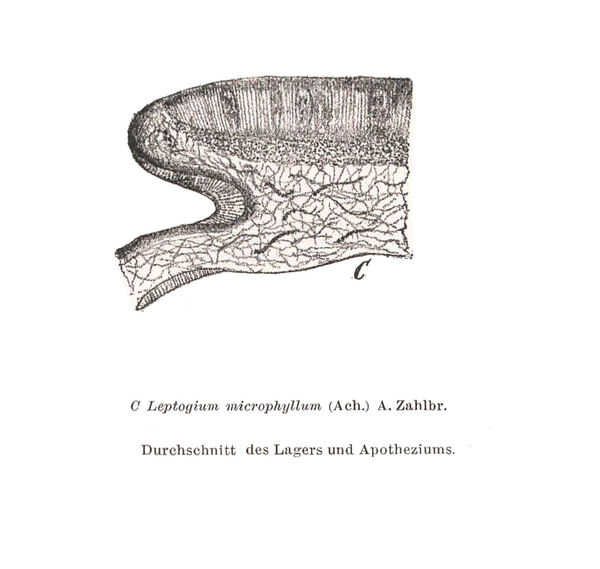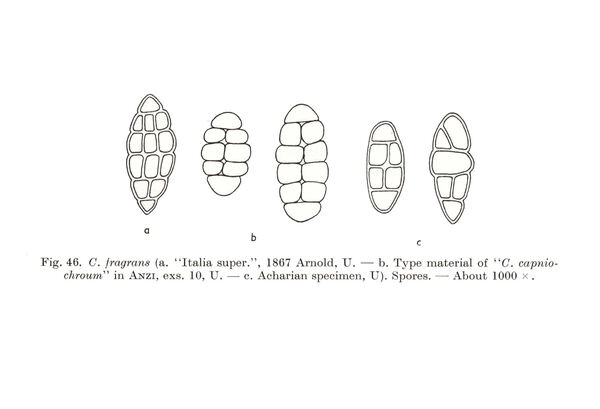Scytinium fragrans (Sm.) Otálora, P.M. Jørg. & Wedin
Fungal Divers., 64, 1: 290, 2013. Basionym: Lichen fragrans Sm. in Smith & Sowerby - Engl. Bot., 27: tab. 1912, 1808.
Synonyms: Collema capnichroum A. Massal.; Collema fragrans (Sm.) Ach.; Collema microphyllum Ach. nom. illegit.; Collema terrulentum Nyl.; Leptogium fragrans (Sm.) Leight.; Leptogium microphyllum (Gray) Leight.; Parmelia crispa var. prasina (Hoffm.) Ach.
Description: Thallus small-foliose to subsquamulose, homoiomerous, slightly gelatinous when wet, forming neat, more or less stellate, to 0.5 cm wide rosettes or small pillows, but individual thalli often crowded and covering larger surfaces, the lobes 0.3-1.5(-2) mm wide, up to 400 µm thick when wet, more or less channelled, not swollen, often crenate, adpressed or ascending, dark olive-green to blackish, sometimes with globose, isidia-like papillae or flattened lobules along the margins and on upper surface. Thallus ecorticate, or with a fragmentary, poorly developed pseudocortex, especially on the lower surface. Apothecia common, lecanorine, crowded in the centre of thallus, 0.4-0.7 mm across, at first immersed, then sessile and constricted at base, with a concave to flat disc, a thin to moderately thick, sometimes papillose thalline margin and a paler parathecial ring. Thalline exciple ecorticate or partly pseudocorticate; proper exciple euparaplectenchymatous; epithecium brownish; hymenium colourless, 80-110 µm high, I+ blue; paraphyses simple or sparingly branched, 1-1.5 µm thick at mid-level, progressively widening towards the apex; hypothecium yellowish. Asci (4-)8-spored, cylindrical-clavate, the apex strongly thickened, the apical dome K/I+ pale blue, with a downwardly projecting K/I+ deep blue tubular structure. Ascospores submuriform to muriform, with 2-5 transverse septa and 2-5 longitudinal septa, hyaline, oval or ellipsoid, 16-30 x 8.5-17 µm. Pycnidia frequent, globose. Conidia short-bacilliform, slightly swollen at both ends, 4-6 x c. 1 µm. Photobiont cyanobacterial (Nostoc, the cells in long chains). Spot tests: all negative. Chemistry: without lichen substances.
Growth form: Foliose, narrow lobed
Substrata: bark
Photobiont: cyanobacteria, filamentous (e.g. Nostoc, Scytonema)
Reproductive strategy: mainly sexual
Most common in areas with a humid-warm climate (e.g. most of Tyrrenian Italy)
Commonnes-rarity: (info)
Alpine belt: absent
Subalpine belt: absent
Montane belt: extremely rare
Dry submediterranean belt: extremely rare
Humid submediterranean belt: rare
Padanian area: absent
pH of the substrata:
1 2 3 4 5
Solar irradiation:
1 2 3 4 5
Aridity:
1 2 3 4 5
Eutrophication:
1 2 3 4 5
Poleotolerance:
0 1 2 3
Altitudinal distribution:
1 2 3 4 5 6
Rarity
absent
extremely rare
very rare
rare
rather rare
rather common
common
very common
extremely common
Loading data...
Occurrence data
Predictive map
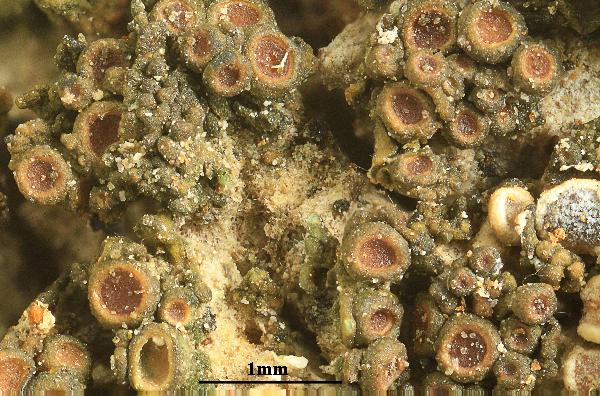
Felix Schumm - CC BY-SA 4.0
[VZ2232], Hispania. Prov. Lérida: Riu del Pendís, Col de Pendís, 1300
m. Supra corticem trunci Populi nigrae. Leg. N. L. Hladun (nr.1538),
22.07.1987. - EX A. V ZDA: LICHENES SELECTI EXSICCATI NR. 2232.
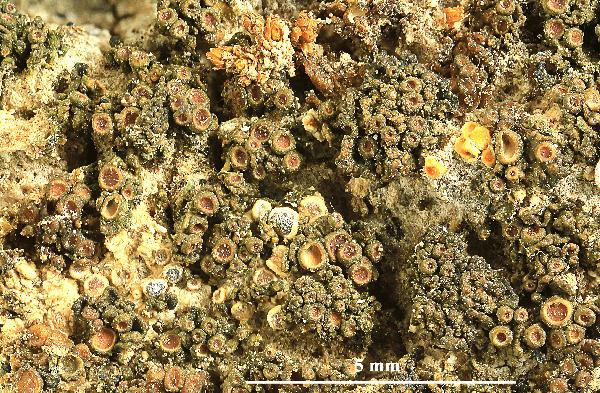
Felix Schumm - CC BY-SA 4.0
[VZ2232], Hispania. Prov. Lérida: Riu del Pendís, Col de Pendís, 1300
m. Supra corticem trunci Populi nigrae. Leg. N. L. Hladun (nr.1538),
22.07.1987. - EX A. V ZDA: LICHENES SELECTI EXSICCATI NR. 2232.
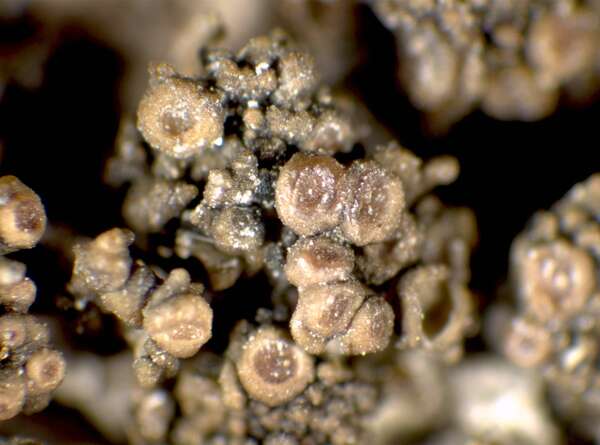
P.L. Nimis; Owner: Department of Life Sciences, University of Trieste
Herbarium: TSB (11486)
2001/12/04
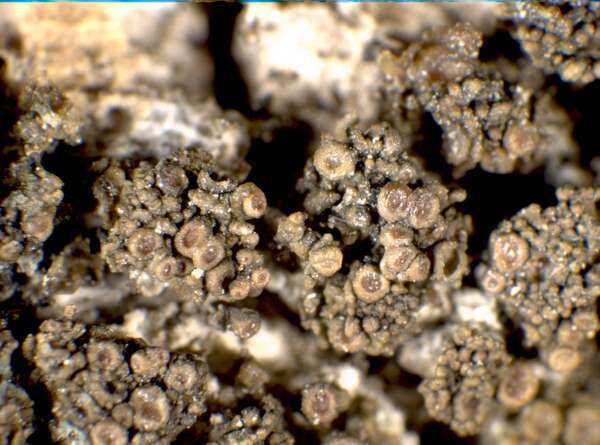
P.L. Nimis; Owner: Department of Life Sciences, University of Trieste
Herbarium: TSB (11486)
2001/12/04
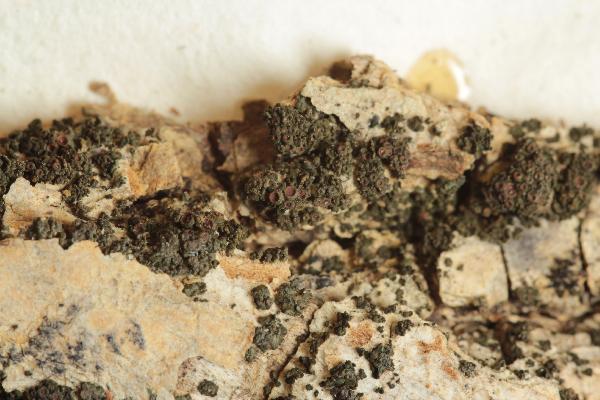
Collezione lichenologica Abramo Massalongo del Museo di Storia Naturale G. Ligabue di Venezia - Autori: Seggi, Linda; Trabucco, Raffaella Proprietà: Fondazione Musei Civici di Venezia - CC BY-NC
Italy, Veneto, Ad Aceris truncos in oppido Tregnago prov. Veron. 1855
as Collema microphyllum
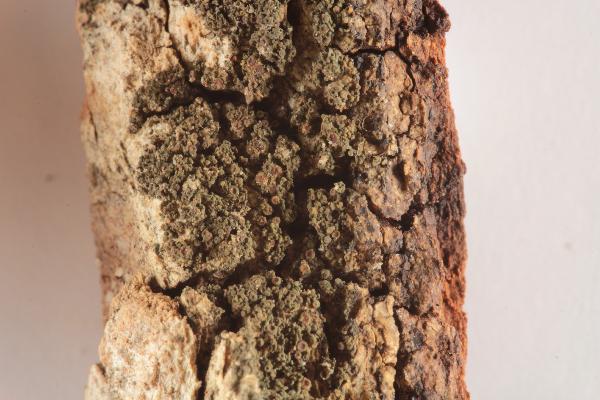
Collezione lichenologica Abramo Massalongo del Museo di Storia Naturale G. Ligabue di Venezia - Autori: Seggi, Linda; Trabucco, Raffaella Proprietà: Fondazione Musei Civici di Venezia - CC BY-NC
Italy, Veneto, in op. Tregnago
as Collema microphyllum
Growth form: Foliose, narrow lobed
Substrata: bark
Photobiont: cyanobacteria, filamentous (e.g. Nostoc, Scytonema)
Reproductive strategy: mainly sexual
Most common in areas with a humid-warm climate (e.g. most of Tyrrenian Italy)
Commonnes-rarity: (info)
Alpine belt: absent
Subalpine belt: absent
Montane belt: extremely rare
Dry submediterranean belt: extremely rare
Humid submediterranean belt: rare
Padanian area: absent
pH of the substrata:
| 1 | 2 | 3 | 4 | 5 |
Solar irradiation:
| 1 | 2 | 3 | 4 | 5 |
Aridity:
| 1 | 2 | 3 | 4 | 5 |
Eutrophication:
| 1 | 2 | 3 | 4 | 5 |
Poleotolerance:
| 0 | 1 | 2 | 3 |
Altitudinal distribution:
| 1 | 2 | 3 | 4 | 5 | 6 |
Rarity
absent
extremely rare
very rare
rare
rather rare
rather common
common
very common
extremely common
Loading data...
Occurrence data
Predictive map

Felix Schumm - CC BY-SA 4.0
[VZ2232], Hispania. Prov. Lérida: Riu del Pendís, Col de Pendís, 1300 m. Supra corticem trunci Populi nigrae. Leg. N. L. Hladun (nr.1538), 22.07.1987. - EX A. V ZDA: LICHENES SELECTI EXSICCATI NR. 2232.

Felix Schumm - CC BY-SA 4.0
[VZ2232], Hispania. Prov. Lérida: Riu del Pendís, Col de Pendís, 1300 m. Supra corticem trunci Populi nigrae. Leg. N. L. Hladun (nr.1538), 22.07.1987. - EX A. V ZDA: LICHENES SELECTI EXSICCATI NR. 2232.

P.L. Nimis; Owner: Department of Life Sciences, University of Trieste
Herbarium: TSB (11486)
2001/12/04

P.L. Nimis; Owner: Department of Life Sciences, University of Trieste
Herbarium: TSB (11486)
2001/12/04

Collezione lichenologica Abramo Massalongo del Museo di Storia Naturale G. Ligabue di Venezia - Autori: Seggi, Linda; Trabucco, Raffaella Proprietà: Fondazione Musei Civici di Venezia - CC BY-NC
Italy, Veneto, Ad Aceris truncos in oppido Tregnago prov. Veron. 1855
as Collema microphyllum



